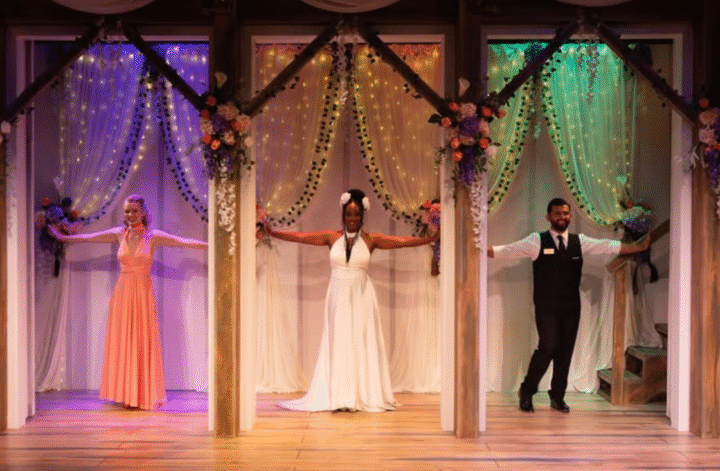It was an honor to be in attendance at the first non-preview performance of a work as original, fresh, and vital as Zoetic Stage’s production of Gringolandia. This new work by Hannah Benitez, a playwright and performer with Miami roots, is the first commissioned piece from Zoetic, an intriguing new initiative for the company that got off to a great start with this past weekend’s world premiere.
Loosely based on Benitez’s actual experiences, Gringolandia follows a father, Carlos and his two twenty-something children, Michi and Danny, on a fated trip to their homeland, Cuba, which Carlos and his family fled as a young boy due to the corrupt communist regime which persists there to this day.
Alicia Cruz, Gabriell Salgado. Photo by Tony Tur
The script fully grapples with the complexity of the three characters’ differing relationships to the country and to their heritage. After a memorable opening scene of seduction, the story gets off to a slightly slow start as it struggles to establish clear stakes but comes alive in a big way after the family embarks on an ill-fated road trip, on which a comedic subplot involving a sexually transmitted disease and a desperate quest for Coca Cola delivers a litany of laughs.
Though this excursion in particular wouldn’t have been out of place in a more mainstream road trip comedy, it also smartly furthers the stories’ themes of the characters wrestling with their privilege and enhances its portrait of Cuba as a place as plagued and problematic as it is vibrant and alive.
For Carlos, the pilgrimage home brings back memories of his childhood and of roads not taken, forcing him to reevaluate his life decisions and self-understanding. The more culturally aware Michi knows Spanish and has made more efforts to learn about Cuban culture, while Danny must be translated for and has been heretofore largely unconcerned with it.
Gabriell Salgado, James Puig, Yarelis Gandul. Photo by Tony Tur
But encounters with cousins who were left behind and with passing strangers who have suffered greatly under Cuba’s harsh conditions force all three to come to grips with the fact that others see them as, and could perhaps rightly describe them as “gringos,” a derogatory slang word generally directed at foreigners.
The musician Yarelis Gandel sets the mood for the play with some pre-show songs and underscores the action with music and sound effects throughout, a marvelously theatrical touch only enhanced by the fact that she briefly joins the proceedings as an actress.
Simple but effective scenic design by Michael McKeever satisfies the eyes with a few bursts of color, and, notably, also incorporates projections of footage captured specifically for the production in Cuba. This made for a few interesting moments, though the action on stage was so consummately engaging that I usually found myself paying relatively little attention to these backdrops.
James Puig, Gabriell Salgado. Photo by Tony Tur
A cast of four incredibly talented performers make it about impossible to name standouts, and top-notch directing by Stuart Meltzer brings out the best in the tight ensemble. For instance, it was a joy to watch James Puig’s mild-mannered Carlos let loose after a few mojitos, as well as, nail the character’s more emotional moments.
Stephanie Vazquez, Alicia Cruz. Photo by Tony Tur

